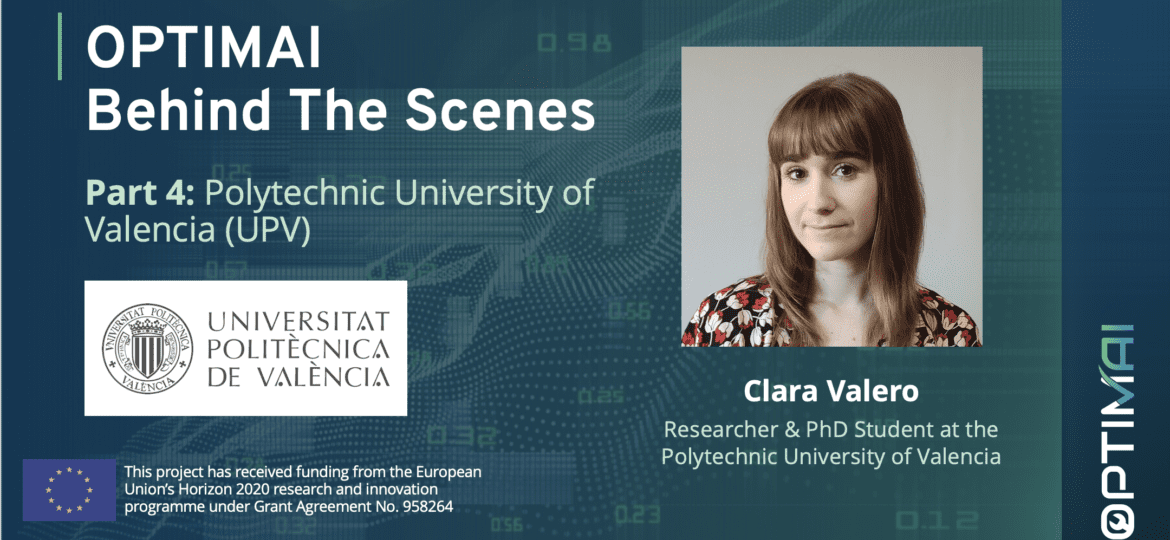
Next up in our Behind The Scenes interview series is the Polytechnic University of Valencia (UPV). We talked to Clara Valero, PhD student and researcher at UPV, about her experience of working on the OPTIMAI project so far.
Hi Clara, thanks for speaking to us today. Could you start by introducing yourself and telling us where you are based?
Hi, my name is Clara Valero and I’m a researcher and PhD student at the Polytechnic University of Valencia, in short UPV. The university consists of three campuses: Valencia, Gandia and Alcoy. The UPV is organized into nine higher technical schools, two faculties and two higher polytechnic schools, which are responsible for organizing the teaching of 39 degrees and has 42 departments and 41 research centres and institutes. The group I am part of, the Distributed Real Time Systems Lab (DRTSL), belongs to the Communications Department and is the group participating in this project.
What does your typical working day in the OPTIMAI project involve?
The UPV is involved in several technical research activities related to the definition and training of predictive algorithms, data analytics, edge-to-cloud computing and interoperability between different sources of data. As the project is still in its initial phase, my day-to-day work includes participating in the definition of technical requirements, analysis of the state of the art or the study of the technologies to be used.
What do you like most about your role?
The UPV is a public entity mainly focused on education and research. Therefore, our role in OPTIMAI is predominantly focused on research and dissemination. OPTIMAI aims to offer a solution for Industry 4.0 based on state-of-the-art technologies. That is, it presents the challenge of using state-of-the-art technologies in highly complex environments where process optimization is key. For us, this represents a challenging scenario that motivates us to apply our knowledge, giving the best of ourselves.
Has working remotely affected your work on OPTIMAI in any way?
No. With the technologies that we have at our disposal today, I can coordinate and work together with both other members of my organization and with the other partners in the project.
What is unique about OPTIMAI in your opinion?
The people behind the project. The team of people that make up OPTIMAI has been built through years of mutual collaboration in other projects. Each of the project partners has been selected for their proven expertise in a specific area. Each one stands out separately for specific qualities, but when we work together the global result is superior.
What makes your organisation ideal for participating in the research/activities of OPTIMAI?
The UPV is a dynamic, innovative, public institution, dedicated to research and teaching that has an important presence abroad. We have experience in a large number of fields within ICT, such as the Internet of Things, mobile communications, real-time distributed systems or broadband networks. In addition, we have participated in a large number of European projects both as coordinators and work package leaders.
What do you see as the biggest challenge for OPTIMAI?
In my opinion, the biggest challenge of the project will be presented during the piloting phase. The pandemic period is not over yet and it looks like we will have to continue living this situation for a while longer. During the pilot phase, the solutions created are installed and validated in real environments. If travel and attendance limitations continue, we will have to adopt new procedures for the deployment and validation of pilots. Fortunately for us, technology is on our side.
Could you describe the overall expected impact of the OPTIMAI project in three words?
Customer-focused, holistic and significant.
What would be your advice to anyone interested in getting involved with a Horizon Europe project?
To enjoy all aspects of the job. It is a very varied job where multiple challenges have to be faced. Working with state-of-the-art technologies makes the work challenging at times, but it is very enriching and ensures you continue learning day by day. In addition, Horizon Europe projects are made up of different profiles of professionals belonging to both private companies and public entities from all over Europe. Working with them on a daily basis is very rewarding because, on the one hand, the knowledge transfer is very high and, on the other hand, strong personal bonds are generated that last over time.
Thank you for taking the time to speak to us, Clara! We look forward to more updates from the team at the UPV.
To keep up to date with the Behind the Scenes series and all OPTIMAI updates, make sure to follow us on Twitter, LinkedIn and YouTube.

